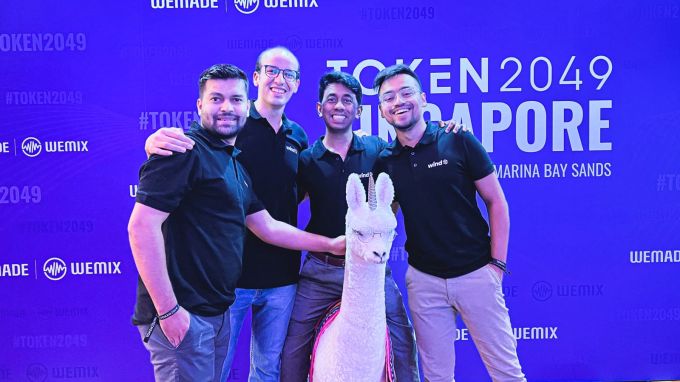Hussain Elius is finest often known as the co-founder of Pathao, considered one of Bangladesh’s prime ridesharing apps. For his newest startup, nonetheless, Elius is exploring the world of DeFi with Wind.app, a self-custodial, good contract pockets with three fundamental options. The primary is enabling companies to ship funds to distant workers all over the world. The second is permitting individuals to make use of Wind.app as a digital checking account. And the third is the on-ramp/off-ramp infrastructure that the corporate is constructing to allow customers to vary their crypto holdings for fiat or vice versa.
To date, Wind.app has facilitated over $3 million in annualized gross transaction quantity (GTV) inside a number of months of its launch. The Singapore-based startup introduced at present that it has raised $3.8 million in pre-seed funding co-led by World Founders Capital and Spartan Group, with participation from backers like Saison Capital, Alumni Ventures and Tiny VC.
By the point Elius left Pathao, it had turn into some of the dominant shopper tech corporations in Bangladesh and Nepal, providing meals supply, funds and BNPL, other than ridesharing, and gaining funding from backers like Gojek. Throughout the COVID pandemic, Elius started exploring crypto. However he realized how arduous it’s to make use of for individuals who, in contrast to him, would not have a tech background.
“I’m a tech-savvy individual. If it takes me seven to 10 days to determine issues like MetaMask, gasoline charges, non-public keys, public keys and mnemonics, from me coming from a shopper tech background and going into crypto, I noticed that crypto remains to be for nerds,” he stated.
Elius determined to construct an app accessible to individuals with minimal blockchain and crypto expertise. For one factor, customers don’t must cope with gasoline charges. They usually additionally retailer their cash in stablecoins, since bitcoin is simply too risky. As an alternative of utilizing non-public or public keys, customers can join Wind.app with their emails or cellphone numbers.

Wind.app’s group. Picture Credit: Wind.app
Wind.app is beginning off by focusing on freelancers and distant employees for fee, particularly in Southeast Asia. It’s stay within the Philippines, India and Bangladesh, and plans to enter extra international locations. Lots of its early clients are different web3 startups. “It’s simple to get our price proposition throughout to different web3 corporations as a result of they get it from day one,” Elius stated. Wind.app permits them to make use of it as an alternative of an trade with excessive charges to pay their distant employees.
Elius says Wind.app differentiates from Sensible or Payoneer as a result of it makes use of blockchain for settlement and is ready to cost decrease charges. One other profit is with the ability to open an account shortly as a result of Wind.app’s self-custodial pockets doesn’t require superior KYC.
“Finally, we wish to go down the ladder and goal the underbanked phase, who don’t have as a lot KYC info anyway, to provide them an easy option to begin accepting cash,” says Elius.
Whereas Wind.app has customers all over the world, it began in Southeast Asia — particularly the Philippines — as a result of there’s a very massive remittance marketplace for USD there. Elius says the nation can also be very crypto savvy, and many individuals are aware of crypto.
“I used to be within the Philippines a few instances and even among the tuk-tuk drivers personal crypto,” he says. “They personal some bitcoin. So it’s each a remittance market and a giant crypto market, which makes it an excellent first market to start out off with.”
One function which will make Wind.app interesting to shoppers it that it has constructed its personal offramp and onramp for fiat and crypto coin.
“The rationale we did that was as a result of we initially tried to make use of totally different companions and noticed it was fairly costly,” Elius stated. “Some other onramps and off ramps cost between 2% to three%, which is rather a lot particularly if it’s a dividend. So we do our personal and we acquired the price all the way down to lower than 30 bips or so. And now we truly began to supply that to different companies, and different companies which can be transferring cash.”
Some corporations in the identical house as Wind.app embrace Binance and Coinbase, however Elius says he doesn’t see them as opponents as a result of individuals use them principally for buying and selling. As an alternative, extra direct opponents embrace Payoneer and TransferWise. “We’re coming in and saying that hey, you recognize we’re totally different as a result of our total tech stack is totally different, our regulatory benefit is totally different,” Elius stated.
When it comes to person security, Wind.app is a self-custodial pockets, which implies the startup doesn’t have entry or management of person funds, Elius says. Equally to Coinbase Pockets, MetaMask or Belief Pockets, wallets are secured cryptographically within the blockchain and their non-public keys are saved straight in customers’ telephones. If Wind.app was to close down, customers would nonetheless have entry to their wallets and might switch funds to different wallets.
Wind.apps new funding will likely be used for tech growth, and procuring licenses and compliance because it builds it off and onramps. A part of it can even be used on the startup’s buyer acquisition technique, together with approaching companies straight and particular person customers, too.







